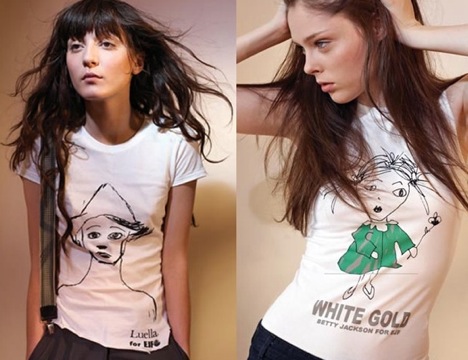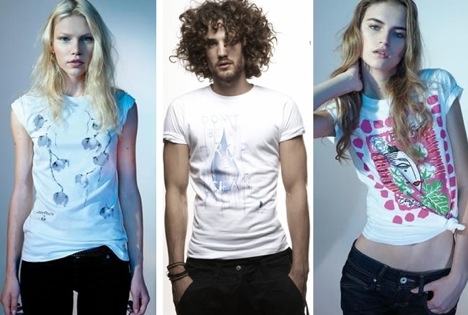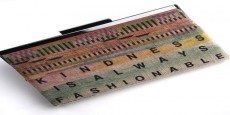
The Environmental Justice Foundation (EJF) has just launched a set of sustainable t-shirts designed by the likes of haute couturiers John Rocha, Zandra Rhodes, Luella Bartley, and Christian Lacroix — to name a few — for summer 2010. The t-shirts are made with fairly traded Continental cotton from Turkey are are designed around the theme, “childhood, lost innocence and hope” in light of EJF’s newly release report, “Slave Nation” on their campaign to end child labor in Uzbekistan. It’s looking like last season’s organic tees are this season’s fairly trade tees.
EJF’s new report, “Slave Nation” exposes how the Government of Uzbekistan continues to lie to the international community while routinely compelling hundreds of thousands of children as labourers in the country’s annual cotton harvest, highlights below.
- Children as young as 10 years old can be dispatched to the cotton fields for two months each year, missing out on their education and jeopardizing their future prospects.
- Reports in November 2009 estimated one million children working in the last harvest. Cotton picking is arduous labour, with each child ascribed a daily cotton quota of several kilos that they must fulfil.
- Children may be compelled to stay in barrack-like accommodation during the harvest. Living conditions are often squalid. In those places where food is provided to children, it is inadequate, often lacking in basic nutrition and children can often only access water from irrigation pipes, which carries health risks.
- Children can be left in poor physical condition following the harvest; illnesses including hepatitis, injuries and even deaths are all reported. The harvest begins in the late summer, when temperatures in the fields remain high and can continue until the onset of the Uzbek winter. Children are not provided with any protective clothing whilst they work.
- Children receive little or no reimbursement for their labour, perhaps a few US cents per kilo of cotton picked. However, payments are deducted to cover their travel to the fields and the food they are provided with during the cotton picking season, which can leave them in debt.
- Uzbekistan is the world’s 3rd largest cotton exporter and earns around US$1 billion annually from the sale of its cotton to clothing factories primarily in Asia, which in turn export garments to the west; and to cotton traders, many of which are based in Europe.
- Since 2007 international retail names including Tesco, Asda-WalMart, and C & A have publicly condemned the use of forced child labour, and rejected Uzbek cotton from their supply chains.
The tees retail for £30 EUR and benefit EJF’s international work, visit EJF for more.
HIT FROM: Treehugger.com














